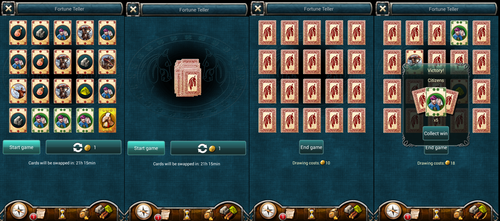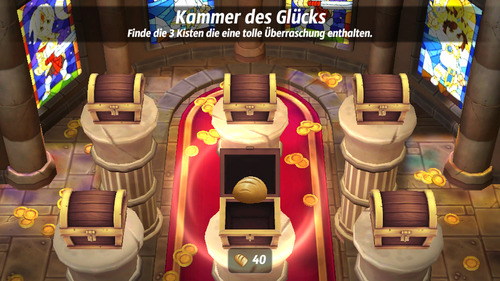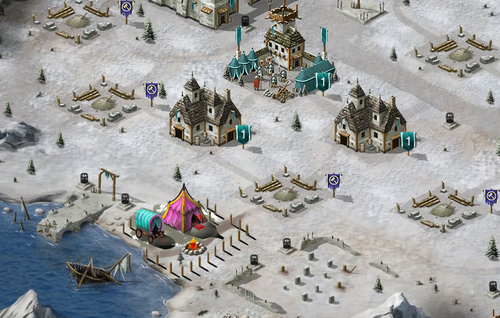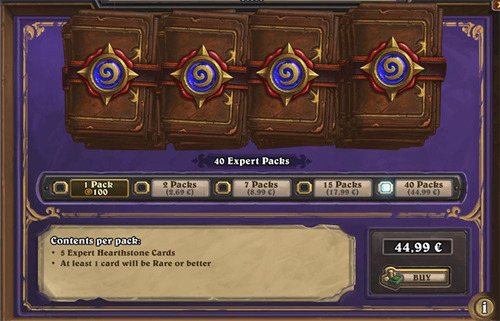
Featured Blog | This community-written post highlights the best of what the game industry has to offer. Read more like it on the Game Developer Blogs or learn how to Submit Your Own Blog Post
We have a winner! - Luck based monetization in f2p mobile games.
This article describes some best practises on how to design a luck-based monetization mechanic in free-to-play mobile games.

For the last 5 years I've been working on different kinds of luck based monetization systems in free -to-play games. Games like Battleknight, Wild Guns or War Game all include some kind of premium feature with random elements. From Gacha, spinning wheels, slot machines to more immersed ones with quests or loot they all share some common properties.
In this article I want to show some of my findings to make the most out of these features. As a leading example I will follow the fortune teller from our mobile game Grimfall Strategy Game.
What's the Fortune Teller?

Basically you get to pick hidden cards with every card corresponding to a possible reward. Easy enough...
In more detail this happens in the following 4 steps:
You are presented the main screen showing all possible rewards. You can reroll the rewards for premium currency or start with the current cards for free. (Every 24h the rewards are refreshed automatically)
When you start the game the cards turn around and then they are shuffled.
You see the card's backs but you don't know which card corresponds to which reward. You are now able to pick a card for premium currency or end the current game. When you end the game you will return to Step 1 and see where your desired cards were.
When you pick a card you get the reward and the price for the next pick is increased.
Properties
The first two things you want to think about are: What kind of rewards should be available? And what are the chances to get these?
We settled for 20 possible rewards in one game, mostly due to screen size on mobile devices. One important aspect is to have enough variety in your rewards to get the lottery interesting. If there are only two possible outcomes you don't need to bother with a random-based implementation. To achieve this there's a second layer of randomness which selects the rewards for the current game based on different probabilities. So we get way more possible combinations as with fixed rewards.
This opens up another opportunity. With more items the chance of one particular item can be lowered. So you are able to introduce very valuable rewards. If these also come as exclusives with unique properties than you've created a strongly desirable jackpot. (In our fortune teller we had Undead units that could only be obtained this way.)
If you're rewarding items that are otherwise purchasable you should always compare the chances and the mean price you would have to pay to get that item. Make sure your „lottery“ can be an advantage for the player but doesn't cannibalize all the other pay features you might have in your game.
Also make sure that your rewards are desirable every time. They might come in small sizes but the player should always get something out of them. He's always a winner and happy to come back and play again.
Mechanics
The core loop of this feature heightens the tension from pick to pick. With every turned card the player gets closer to his goal. Every new card promises a higher chance to that jackpot. Every new card means a higher investment and there's more at stake. Loss aversion of the invested money and the higher chance to win keeps the player engaged.
Yes every pick is more desirable than the pick before. But as the price for every pick increases drastically and way faster than the chance of hitting the jackpot there's a sweet spot where you should start over. But as there are other valuable rewards also depending on the player's current game situation it's hard to tell when you should drop out exactly... a classic risk-reward mechanic.
Another important aspect regarding mechanics is the feel of control. As the game doesn't chose which card to pick the player perceives the outcome as more fair. It's not the game's fault that she missed the jackpot. She selected the wrong card herself. Also the increased interactivity simply makes the system more fun to use... even though there are few meaningful decisions to make.
The feeling of control is reinforced by the reroll mechanic which allows the player to control the possible outcome of the lottery to a certain extent.

Royal Revolt 2 [1] also gives the player a similar way to control the outcome of their lottery as you pick chests by yourself.
The downside for this kind of premium feature is the increased complexity which might turn some users away. If they aren't 100% sure on what they spend their money they might back off. But as the game itself is focused on a more hardcorish audience and the player gets to know the feature by free-rolls this barrier is fairly easy to overcome.
Free-rolls as a proven concept help players get used to the fortune teller and improve the perceived fairness of the overall game as they allow non-payers to obtain the exclusive rewards another way. They are also used as a reward in the login bonus for general retention purposes.
Presentation
The presentation of such a feature is also key to its success. Besides the obvious perks like aesthetics, joy of use and responsiveness you should consider some additional goals you want to achieve. One very important aspect is the visibility of your premium feature and the player's awareness of it. In Grimfall we decided to make the fortune teller's building very colorful (despite our normal pale art style) and we present the free-rolls on login with a popup directly leading the player to try it out. If you have structured game sessions you might want to add the feature there. As in Royal Revolt 2 you will be confronted with the chests after every successful fight making sure nobody is going to miss out.

Our colorful fortune teller right in the center of our city.
A great way to increase the visibility is to shout out rewards that other players have won. If your player base is large enough that jackpots get won every other hour than show other players these events and they will be more likely to believe that a jackpot is actually achievable. Also if other players are willing to pay money for that they show their approval of the lottery's worth.
To further enhance the player's trust you should communicate transparently what your rewards are and how your chances are of winning them. Gacha has problems in this area as you often have to spend money without actually knowing how high your chances are of winning and what exact rewards are waiting for you. (Though sometimes chances are that low that you don't even want to tell the player.)

What is Hearthstone [2] actually selling me? I'm uncertain to spend 45€ on that.
In our case the player sees every possible outcome of the game and gets a good feeling of how likely it is to draw one particular card. He also is able to tap on every reward to get more details.
Another mechanic I tried to emulate is the „near-win“ that you have in slot machines and spinning wheels. When you see that you were very close to winning that jackpot than you are more likely to play again even though the odds didn't change. By showing every reward and its position after you have ended the game you get a sense of how close you missed the card that you actually wanted to find.
Last but not least you should aim for some coherence with your game world. The feature is much more likely to be accepted if it feels like it naturally belongs to your world. A fortune teller matches with the expectations of the player in a medieval setting and cards work as a fitting metaphor for that fortune teller.
This concludes the findings I had while designing the Fortune Teller and I hope it shed some light on how to make these kind of monetization features work. If you want to see the system in action go ahead and download the game from one of the stores:
Android - http://bit.ly/Grimfall-Android
iOS - http://bit.ly/iOS-Grimfall
Tim Rachor - http://santorayo.tumblr.com/
Game Designer at Gameforge
[1] – Royal Revolt 2, http://royalrevolt.com/, flaregames GmbH
[2] – Hearthstone, http://eu.battle.net/hearthstone/en/, Blizzard Entertainment Inc.
Read more about:
Featured BlogsAbout the Author(s)
You May Also Like







.jpeg?width=700&auto=webp&quality=80&disable=upscale)








